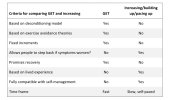Nightsong
Senior Member (Voting Rights)
Moved from the News from BACME thread.
It was brought to my attention that BACME have apparently produced a new version of their "guide to therapy" (used by some of the NHS clinics) recently:
BACME Guide to Therapy - redraft 2025
I haven't been able to read through but running Adobe Acrobat's PDF comparison tool on the 2022 and 2025 versions indicates there are a significant number of changes.
It was brought to my attention that BACME have apparently produced a new version of their "guide to therapy" (used by some of the NHS clinics) recently:
BACME Guide to Therapy - redraft 2025
I haven't been able to read through but running Adobe Acrobat's PDF comparison tool on the 2022 and 2025 versions indicates there are a significant number of changes.
Last edited by a moderator:

